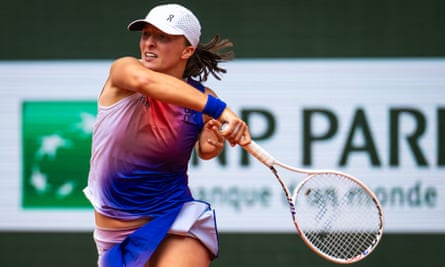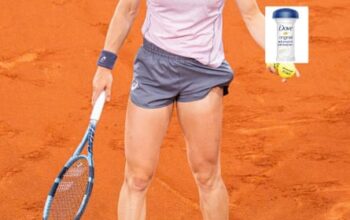In the early stages of a thrilling French Open quarter-final between Coco Gauff and Ons Jabeur, the American was up against it. Jabeur came out of the blocks flying; she served flawlessly and controlled the vast majority of exchanges with her forehand. Jabeur also brought out her deep toolbox of shots, from drop shots to spectacular jumping backhands as she took the opening set.
But even though she is still only 20 years old, Gauff has already been in positions like this so many times in her young career. She has stared down countless one-set deficits, cooled down on-fire opponents and she has also had to untangle her own game and find a way to win. The third seed showed once again why she is one of the most tenacious match players in the world as she recovered to reach the semi‑finals with a stellar 4-6, 6-2, 6-3 win against Jabeur, the eighth seed.
Things will only get tougher. Gauff next faces the world No 1 and tournament favourite, Iga Swiatek, who continues to chase a third successive Roland Garros title. Swiatek has followed up her dramatic win against Naomi Osaka by bulldozing everything in her path. Two days after eviscerating Anastasia Potapova 6-0, 6-0 in 40 minutes, Swiatek handled the Wimbledon champion and fifth seed, Marketa Vondrousova, with similar disdain, winning 6-0, 6-2 in 62 minutes.
Gauff has now reached the semi‑finals of the past three grand slam tournaments and she holds four titles. A measure of her consistency: her current WTA ranking points total, adjusted for recent changes to the rankings, is higher than the points held by the 2017, 2018, 2019 and 2021 year-end No 1 players. Still, she could finish the tournament ranked No 3.
These high standards have been driven by the excellence of Swiatek. The rest of the top four have done well to elevate their own games in order to keep up with Swiatek on clay: which is reflected in the fact this is the first time since the 2013 Australian Open that five women’s grand slam champions have reached the quarter‑finals of a major tournament. Swiatek showed in her demolition of Vondrousova, though, that she can overwhelm anyone.

Having fulfilled her seeding, Gauff now faces the ultimate test in the game. She is 1-10 against Swiatek, who is both an incredible player in general and specifically a terrible match-up for Gauff, with the Pole constantly looking to break down Gauff’s vulnerable forehand, particularly with her own heavy forehand. Three weeks ago in Rome, Gauff played one of her best matches against Swiatek; she attacked well, she looked to take time away from her opponent and her forehand held up well. Despite playing well, she still lost 6-4, 6-3.
After her win against Jabeur, Gauff was asked what it is like to face someone who has beaten her 10 times. “I’m just going in with confidence,” she said.
after newsletter promotion
“When I played her in Cincinnati, I didn’t go into the match thinking: ‘Oh, I’ve never beaten her before, never taken a set off of her.’ So I can’t think of past players. Potapova isn’t me. I’m not Vondrousova. It doesn’t mean anything. Maybe I could lose with the same score, maybe not, but I’m just going to go in and try to win. I have nothing to lose. All the pressure is on her, so yeah.”
The French Open has now placed women’s matches as the first morning match every day this year and no women’s match has been scheduled for the prime-time night session. After her defeat, the only tight match of the session, Jabeur repeated her criticisms of the tournament.: “I wish I can see the contract time between both [Amazon] Prime and here to know what’s the deal there,” she said. “There was a lot of good women’s matches. Obviously not four hours, but who said it’s healthy to play past 1am, and who said the stadium was full for 1am or 2am? I don’t know who is watching the matches at that time. Again, I would suggest to start earlier and then put nice matches on both sides.”


